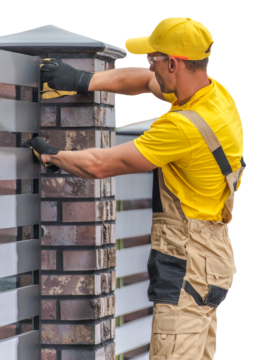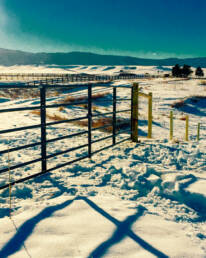Although vinyl, aluminum and other metal fencing requires less maintenance than wood fencing, there are still a few winter maintenance jobs to perform.
Colorado Winter Storms Can Wreak Havoc on Fences & Property
Colorado has experienced historic blizzards and snowstorms over the years. Wooden fences are the most vulnerable of materials, but any type of fence can be greatly damaged during a strong winter storm. These damages occur due to sustained and high winds, falling tree limbs, heavy snow and ice accumulations, on and near the fence, along with moisture damage that may result in mold and mildew growth as well.
Make Certain Your Fence Is in Good Condition Before Winter Begins
Fence owners should take the necessary time to make certain that their fence is in good condition before the winter months arrive. This involves a thorough inspection of the entire fence to spot any damage or trouble areas that will need addressed. If unsure on what to look for when inspecting a fence, consider hiring a local fence expert to perform the job for you.
Things to look for when assessing your fence include:
- Loose or warped boards or fence sections
- Dark stains that could indicate moisture, mold or mildew issues
- Cracks, gaps or holes
- Chipped or peeling paint or untreated fence materials
- Wobbly fence portions could indicate a post problem underground
Perform Any Manufacturer Maintenance Tasks for Your Fence Type Regularly
Metal fences should have protective sealants to help protect them from rust and corrosion through the years. Always follow the fence manufacturer directions with regards to maintenance and upkeep. Most aluminum and other metal fences, along with vinyl fences, typically require little maintenance and upkeep. However, damage can still occur due to freezing, moisture, soil shifts, where posts are present, and damage caused by falling debris, high winds or drifting snow and/or ice accumulations.
Wooden fences require extensive and ongoing maintenance to maintain their stability and good condition. Wood fences will need repainted typically once a year. Some wooden fence materials come pretreated, and this is highly recommended in cold climates where winter weather can be an issue. It is often necessary to reapply a protective coating on wood fence panels or boards to keep out moisture and help prevent mold and mildew growth that can literally cause the wood to rot.
Remove Decorative Items & Avoid Storing Items on Your Fence
While it is certainly possible to add flower planters and other decorations to a fence, leaving these items during the winter months can cause increased accumulation of snow, hail or ice that can weigh the fence sections down eventually causing serious and expensive to fix damages. Remove any decorative items prior to winter and keep an eye on winter seasonal decorative items and remove these items promptly to help avoid further problems.
Keep Debris, Brush & Grass Away from Your Fence Before Winter
Wind gusts often push outside debris up against fences. This can cause damage over time. Debris includes leaves, twigs, dirt, trash, tree branches and other items. Keep debris from piling up near your fence. This is especially important before the winter season begins.
Rake away leaves and other debris in the fall to avoid wintertime fence damage. Keep grass and shrubs planted near the fence mowed regularly and remove weeds to avoid these plant materials from growing in between fence sections that could eventually weaken the fence causing damage.
Fix any noticeable damages like small holes or cracks in a wooden fence.
Trim Back Hedges or Tree Branches Near Your Fence Prior to Cold Weather
If there are any tress or hedges planted near your fence, trim them back prior to the onset of cold weather. Loose branches can be snapped off during high wind, snow and ice storms. If these items land on your fence, the damage can be catastrophic and may require fence replacement.
Avoid Piling Up Snow Too Close to Your Fence
Many fence owners make the grave mistake of piling up snow too close to their fence. Many homeowners use a plowing service that may be unaware of where your fence is. Always try to pile up snow in the center portion of your yard rather than pushing it against your vulnerable fence.
This might require extensive shoveling of snow that snowplows push onto your property during the winter months of the year.
Gently Clear Off Snow & Ice After Heavy or Strong Winter Storms
After every snowstorm, gently clear off any snow or ice accumulations using a brush or broom rather than metal tools like shovels. Do this carefully to avoid scratching the surface of your fence.
Take Care of Moisture Problems & Address Grime, Mold or Mildew Promptly
If you notice stains on your fence, there is likely a moisture problem that will need assessed and fixed to avoid future moisture problems. Continued moisture issues can weaken fence materials and shift the soil around the posts that are underground causing the fence to become unstable and even to fall over during a storm.
Untreated moisture problems can also increase the risks of mold and mildew growth on your fence that can become expensive and difficult to repair.
Colorado winters can be aggressive and severe. This can cause property damage which includes issues related to fences. Learn how to properly handle weather related fencing repairs or replacement of damaged fence portions.
Carefully Clean Off Your Fence Following Winter
Most fencing experts recommend cleaning off your fence following the winter season to help prevent damages and other issues. Assess and carefully wipe down any dirty fence portions using a cleaning solution recommended for your fence material type. Assess any dark stains or other moisture problems. These will need fixed to ensure the good condition and long life of your fence over time.
Do a Thorough Inspection of Your Fence to Assess Any Damage
It is so important to perform a thorough inspection of your fence in the springtime months after the snow and ice are gone. Some property owners are unsure of what to be on the lookout for and hire a professional fence expert instead. This can help to ensure that any problems are quickly identified and repaired.
Make Repairs Quickly or Replace Fencing in Badly Damaged Areas
Always make fence repairs swiftly to help avoid further fence problems like warping, missing portions, cracks, rotten wood or shifting posts among other fence issues that include the growth of fence damaging mildew and mold. Fence sections that are badly damaged may need to be replaced.
Leaving a fence vulnerable during or after severe wintertime weather in Colorado can be a serious mistake. Broken fence sections can also be a safety hazard to people, other property, pets and livestock. Some property owners rely on their fences to keep out nearby wildlife that could damage their gardens, crops or lawns.
Keep your fence in tiptop shape and learn more about how to maintain your fence in Colorado winters by contacting Denco Fence Company by phone or online. Visit online anytime for estimates and further details.

Need an expert opinion? Talk to our experts today!
When you talk to our experts at Denco Fence Company, we’ll help you compare fence styles, share design ideas, and answer any questions along the way. If you’re looking to build or repair a fence that you and your neighbors are going to love, get a free estimate and let us help bring your project to life.

